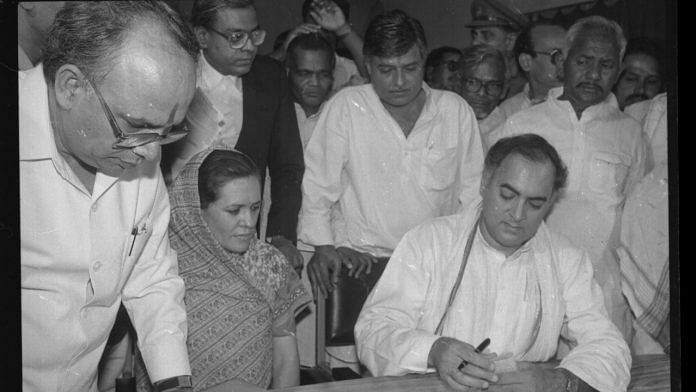Chandigarh: The question that arises from Prime Minister Narendra Modi’s challenge to the Congress to contest elections in Punjab and Delhi in the name of Rajiv Gandhi is this: Did the Congress really suffer electorally in Punjab following the 1984 anti-Sikh riots?
At an election rally in Jharkhand Monday, Modi referred to the alleged role of former prime minister Rajiv Gandhi in the 1984 anti-Sikh riots following the assassination of Indira Gandhi on 31 October. Modi’s challenge came in the wake of widespread criticism for his “corrupt no. 1” remark about Rajiv Gandhi made a day earlier.
But records show that the Congress wasn’t trounced in the elections that immediately followed the pogrom of Sikhs.
In September 1985, less than 10 months after the riots, general and assembly elections were conducted in Punjab. (Punjab was left out of the general elections of 1984 due to internal disturbances and these were held later).
There were several landmark events that preceded the 1985 polls in Punjab: Operation Blue star of June 1984, the anti-Sikh riots of November 1984, the Rajiv-Longowal accord of July 1985 and the assassination of Sant Harchand Singh Longowal, the president of the Shiromani Akali Dal (SAD) in August 1985.
The electorate was sharply divided on communal lines and the elections took place under the shadow of guns after militants called for a boycott. While there were 39 Independent candidates in the parliamentary polls, a record number of 542 Independents contested the assembly elections.
The general elections of 1985
As many as 74 candidates were in the fray for 13 Lok Sabha seats in Punjab. More than 67 per cent of the over 1 crore electorate cast their vote.
The Shiromani Akali Dal, then under the leadership of Surjit Singh Barnala, won seven seats and the Congress won six. But the Congress mustered over 41 per cent of the total vote share, polling more than the Akalis, who had a little over 37 per cent.
Among those victorious were prominent Sikh Congress leaders — then Congress president Rajinder Singh Sparrow won from Jalandhar, Gurdial Singh Dhillon won the Ferozepur seat and Sukhbans Kaur won from Gurdaspur.
The Congress fared better in Punjab than it did in Assam where Lok Sabha polls had been delayed and also held in 1985. In Assam, the Congress won only 4 of the 14 seats in the state.
Also read: Sajjan Kumar, the powerful Jat leader who remained untouched by 1984 riots for 25 years
Akalis sweep assembly polls
In the assembly polls, however, Akalis registered a historic victory, winning for the first time on their own. They won 73 seats in the 117-member assembly on their own.
SAD had contested only on 100 seats. The party mopped up a little over 38 per cent of the vote share, up by almost 11 per cent since the 1980 assembly polls. Parkash Singh Badal, who had by then been the chief minister once, won the Gidderbaha assembly seat while current Congress Chief Minister Captain Amarinder Singh won from Talwandi Sabo. Amarinder had resigned from the Congress following Operation Blue Star and had then joined the Akalis.
Barnala was elected the chief minister of the state. Both Badal and Amarinder were inducted as ministers. Barnala’s term as CM was short-lived as two years later, in 1987, President’s rule was once again imposed in the state.
Congress not exactly destroyed
The Congress did not fare well in the assembly elections but it was not quite destroyed. It won 32 seats (almost one-third of the assembly strength of 117) and got almost an equal share of votes as the Akalis (38 per cent). Its vote share, however, was almost 7 per cent less than what it had managed in the 1980 elections.
“There is no doubt that the 1984 anti-Sikh riots was a major issue in these elections. But those who supported the Congress went ahead and voted for its candidates,” said Ashwani Sekhri, a senior Congress leader who was among the winners in the 1985 polls.
“Those were my first elections. I was only 25 and won by over 14,000 votes,” he recalled.
A woman candidate, “Indira” — a name that would have been hated in Punjab at that time — won from the Jalandhar Cantonment seat on a Congress ticket by a margin of almost 8,000 votes.
Electorate divided communally
The seats on which Congress won were largely Hindu-dominated but there were several Sikhs too who won these elections on Congress tickets.
Punjab’s noted historian J.S. Grewal explained this in his seminal work History of the Sikhs.
“Polarisation between Hindus and Sikhs of Punjab, which had been increasing gradually in the early 1980s and rather suddenly after Blue Star and the Delhi massacre got reflected in these elections,” he wrote.
“Many who had always voted for the Congress now voted for the Akali Dal. Just as the bulk of the Sikhs support shifted to the Akalis, the bulk of the Hindu support went to the Congress. Never were Punjabis split so clearly on communal lines as in the elections of September 1985.”
Also read: As another AAP MLA defects to Congress in Punjab, party set to lose main opposition tag




Congress has fared well in Punjab after 1984 lynching of Sikhs because of Hindus’ sympathy due to the assassination of Indira Gandhi. Today’s situation is different.
There is a Congress government in Punjab today. Dr Singh had many fine qualities. However,, appointing him as PM was also a very graceful outreach to the community.